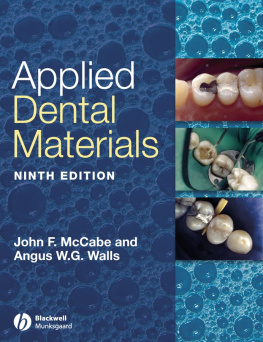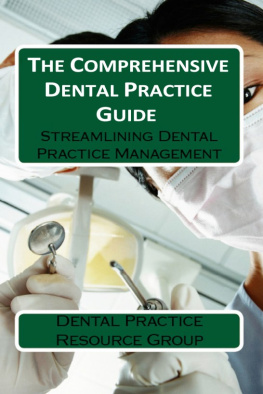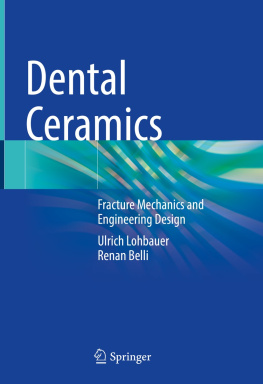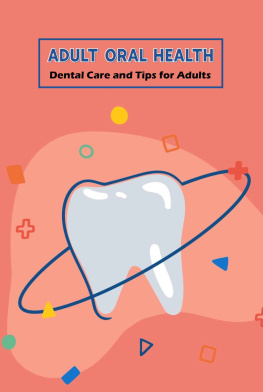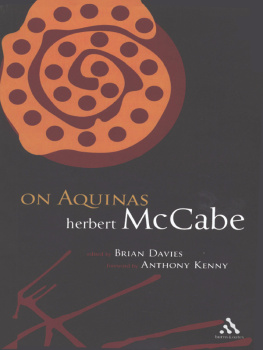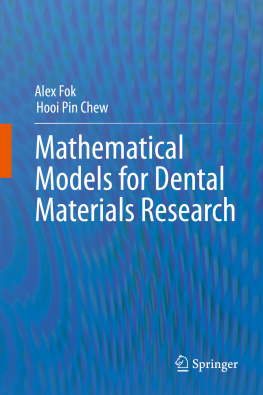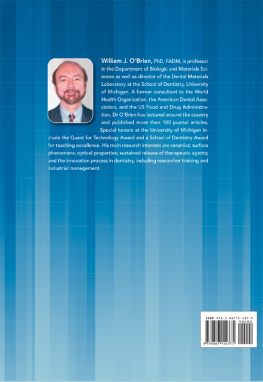McCabe John F. - Applied Dental Materials
Here you can read online McCabe John F. - Applied Dental Materials full text of the book (entire story) in english for free. Download pdf and epub, get meaning, cover and reviews about this ebook. year: 2009;2013, publisher: Wiley, genre: Children. Description of the work, (preface) as well as reviews are available. Best literature library LitArk.com created for fans of good reading and offers a wide selection of genres:
Romance novel
Science fiction
Adventure
Detective
Science
History
Home and family
Prose
Art
Politics
Computer
Non-fiction
Religion
Business
Children
Humor
Choose a favorite category and find really read worthwhile books. Enjoy immersion in the world of imagination, feel the emotions of the characters or learn something new for yourself, make an fascinating discovery.
- Book:Applied Dental Materials
- Author:
- Publisher:Wiley
- Genre:
- Year:2009;2013
- Rating:3 / 5
- Favourites:Add to favourites
- Your mark:
- 60
- 1
- 2
- 3
- 4
- 5
Applied Dental Materials: summary, description and annotation
We offer to read an annotation, description, summary or preface (depends on what the author of the book "Applied Dental Materials" wrote himself). If you haven't found the necessary information about the book — write in the comments, we will try to find it.
Applied Dental Materials — read online for free the complete book (whole text) full work
Below is the text of the book, divided by pages. System saving the place of the last page read, allows you to conveniently read the book "Applied Dental Materials" online for free, without having to search again every time where you left off. Put a bookmark, and you can go to the page where you finished reading at any time.
Font size:
Interval:
Bookmark:


2008 by Blackwell Publishing Ltd
Blackwell Publishing editorial offices:
Blackwell Publishing Ltd, 9600 Garsington Road, Oxford OX4 2DQ, UK Tel: +44 (0)1865 776868
Blackwell Publishing Professional, 2121 State Avenue, Ames, Iowa 50014-8300, USA Tel: +1 515 292 0140
Blackwell Publishing Asia Pty Ltd, 550 Swanston Street, Carlton, Victoria 3053, Australia Tel: +61 (0)3 8359 1011
The right of the Author to be identified as the Author of this Work has been asserted in accordance with the Copyright, Designs and Patents Act 1988.
All rights reserved. No part of this publication may be reproduced, stored in a retrieval system, or transmitted, in any form or by any means, electronic, mechanical, photocopying, recording or otherwise, except as permitted by the UK Copyright, Designs and Patents Act 1988, without the prior permission of the publisher.
Designations used by companies to distinguish their products are often claimed as trademarks. All brand names and product names used in this book are trade names, service marks, trademarks or registered trademarks of their respective owners. The Publisher is not associated with any product or vendor mentioned in this book.
This publication is designed to provide accurate and authoritative information in regard to the subject matter covered. It is sold on the understanding that the Publisher is not engaged in rendering professional services. If professional advice or other expert assistance is required, the services of a competent professional should be sought.
First published 1956. Second edition 1961. Third edition 1967. Fourth edition 1972.
Fifth edition 1976. Sixth edition 1985. Seventh edition 1990. Eighth edition 1998.
Ninth edition published 2008 by Blackwell Publishing Ltd
ISBN-13: 978-1-4051-3961-8
Library of Congress Cataloging-in-Publication Data
McCabe, J.F. (John F.)
Applied dental materials. 9th ed. / J.F. McCabe, A.W.G. Walls.
p. ; cm.
Includes bibliographical references and index.
ISBN: 978-1-4051-3961-8 (pbk. : alk. paper)
1. Dental materials. I. Walls, Angus. II. Title.
[DNLM: 1. Dental Materials. WU 190 M477a 2008]
RK652.5.A55 2008
617.695dc22
2007044377
A catalogue record for this title is available from the British Library
The publishers policy is to use permanent paper from mills that operate a sustainable forestry policy, and which has been manufactured from pulp processed using acid-free and elementary chlorine-free practices. Furthermore, the publisher ensures that the text paper and cover board used have met acceptable environmental accreditation standards.
For further information on Blackwell Publishing, visit our website: www.blackwellpublishing.com
Preface
In producing this ninth edition of Applied Dental Materials we have updated the text in both content and appearance. We hope that the book will remain helpful to students and teachers of the science of dental materials alike by remaining true to the core principles and developing them into a more comprehensive text which covers a wide spectrum of materials falling within the scope of dental materials. Hence, there are more references to practical issues like handling and clinical performance of materials, whilst maintaining a strong link to quality issues encompassed within newly developed ISO standards. Some areas, such as adhesion, ceramics, light activation technology, CAD-CAM have been developed and expanded significantly from the eighth edition, reflecting significant changes or developments in these areas. There is a new chapter on endodontic materials. All areas have benefited from a fresh approach to the use of drawings and photographs including the use of colour for the first time.
John McCabe
Angus Walls
The science of dental materials involves a study of the composition and properties of materials and the way in which they interact with the environment in which they are placed. The selection of materials for any given application can thus be undertaken with confidence and sound judgement.
The dentist spends much of his professional career handling materials and the success or failure of many forms of treatment depends upon the correct selection of materials possessing adequate properties, combined with careful manipulation.
It is no exaggeration to state that the dentist and dental technician have a wider variety of materials at their disposal than any other profession. Rigid polymers, elastomers, metals, alloys, ceramics, inorganic salts and composite materials are all commonly encountered. Some examples are given in along with some of their uses in dentistry.
This classification of materials embodies an enormous variation in material properties from hard, rigid materials at one extreme to soft, flexible products at the other.
Many dental materials are fixed permanently into the patients mouth or are removed only intermittently for cleaning. Such materials have to withstand the effects of a most hazardous environment. Temperature variations, wide variations in acidity or alkalinity and high stresses all have an effect on the durability of materials.
Normal temperature variations in the oral cavity lie between 32C and 37C depending on whether the mouth is open or closed. The ingestion of hot or cold food or drink however, extends this temperature range from 0C up to 70C. The acidity or alkalinity of fluids in the oral cavity as measured by pH varies from around pH 4 to pH 8.5, whilst the intake of acid fruit juices or alkaline medicaments can extend this range from pH 2 to pH 11.
The load on 1 mm2 of tooth or restorative material can reach levels as high as many kilograms indicating the demanding mechanical property requirements of some materials.
Many products, for example direct filling materials, are handled entirely by the dentist and their chairside assistant and are rarely encountered by the dental technician. Other materials are generally associated with the work of the dental laboratory and in this case both technician and dentist require a thorough knowledge of the materials in order that they may communicate about selection, manipulation and any problems which arise. A third group of materials link the dental surgery and the laboratory. The most obvious example of such products is the impression materials. Whilst the latter are under the direct control of the dentist it is essential that the dental technician also has a sound knowledge of such materials.
The process of materials selection should ideally follow a logical sequence involving (1) analysis of the problem, (2) consideration of requirements, (3) consideration of available materials and their properties, leading to (4) choice of material. Evaluation of the success or failure of a material may be used to influence future decisions on materials selection. This selection process is illustrated in . Many experienced practitioners carry out this sequence with no apparent effort since they are able to call upon a wealth of clinical experience. However, when presented with new or modified materials even the most experienced dentist should return to a more formal type of selection process based on the criteria mentioned.
Diagram indicating the wide variety of materials used in dentistry and some of their applications.
Next pageFont size:
Interval:
Bookmark:
Similar books «Applied Dental Materials»
Look at similar books to Applied Dental Materials. We have selected literature similar in name and meaning in the hope of providing readers with more options to find new, interesting, not yet read works.
Discussion, reviews of the book Applied Dental Materials and just readers' own opinions. Leave your comments, write what you think about the work, its meaning or the main characters. Specify what exactly you liked and what you didn't like, and why you think so.

